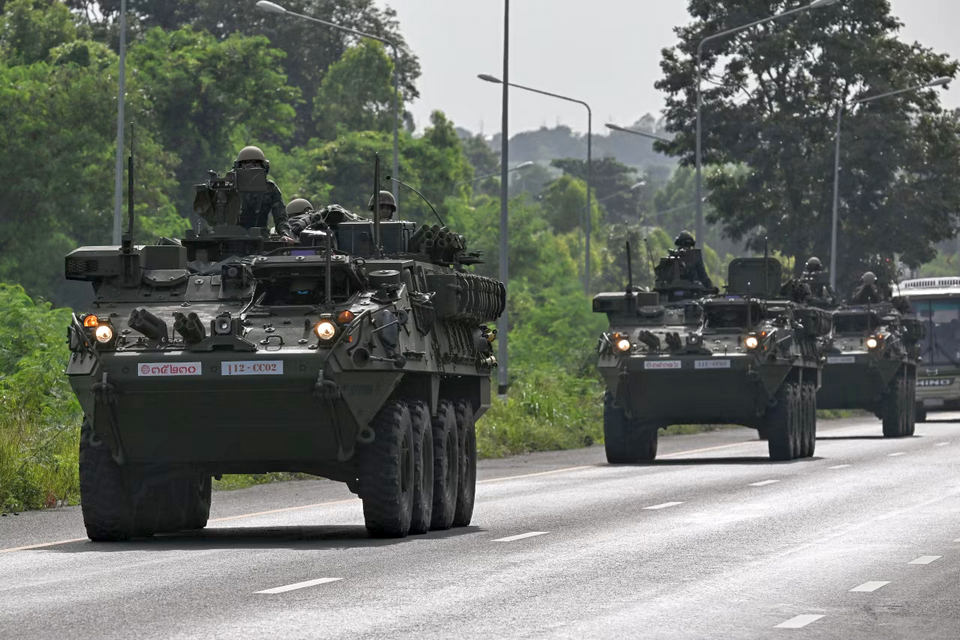While the border clash between Thai and Cambodian forces may raise global concern, a calm assessment is essential — especially for foreign investors and long-stay residents in Thailand. This analysis looks beyond the headlines to examine Thailand’s economic fundamentals and the actual impact on the foreign community.
While the border clash between Thai and Cambodian forces, may raise eyebrows globally, it is important to assess the situation calmly, especially for foreign investors and long stay residents in Thailand. This analysis offers a clear view of Thailand’s current economic fundamentals, the real impact on foreign presence in the country, and why stability remains intact for the vast majority of regions and sectors.
1. Thailand’s Economic Recovery Is Ongoing but Still Sensitive to Shocks
As of mid-2025, Thailand’s economic landscape is best described as “fragile but progressing” Q2 GDP growth stands at 2.3%, below regional averages but steadily recovering from pandemic era lows. Household debt remains high at over 91% of GDP, dampening local consumption. Tourism has returned to ~75% of pre-COVID levels, with strong inflows from ASEAN and India, though China and Europe remain slower to rebound. The Thai baht remains moderately volatile, reflecting global uncertainties more than domestic fundamentals. The current border incident occurs during a delicate recovery phase and could weigh on investor sentiment if not managed with swift and clear communication.
2. Impact on Foreign Businesses, Expats, and Tourists
Foreign Investors and Industrial Operators. Multinational manufacturers, especially those with facilities in Eastern Economic Corridor (EEC) provinces like Chonburi and Rayong, have not been directly affected by the border unrest. However, risk assessments are being updated, especially for industries relying on Cambodian labor or cross border logistics. Japanese, Korean, and European investors are likely to temporarily adopt a “wait-and-see” approach before further expansion.
Long Stay Expats and Tourists. Popular expat hubs such as Pattaya, Chiang Mai, Phuket, and Hua Hin remain entirely peaceful and unaffected. Foreign embassies have issued routine travel advisories, not evacuation notices. Expatriates holding long term visas (LTR, Retirement, Work permits) are not impacted legally or logistically by the border situation. For now, Thailand remains a safe, functioning, and welcoming destination for foreign residents and visitors.
3. What Thailand Can and Is Likely to Do to Preserve Confidence
To maintain investor and expatriate trust, the Thai government should consider. Clear, multilingual communication from government spokespersons and the Ministry of Foreign Affairs, reinforcing that this is a localized incident. Engaging directly with embassies and foreign chambers of commerce, to maintain transparency and confidence in safety and continuity. Incentivizing domestic tourism and border-area investment recovery, should disruptions to logistics persist. Closely monitoring SME sectors relying on Cambodian workers or supply chains, and offering short term labor substitution or automation support.
Bottom Line: Calm, Resilience, and Opportunity
“In an uncertain world, countries that manage their crises with transparency and stability will emerge stronger.” Thailand’s core economic zones, infrastructure, and institutions remain unaffected by the border tensions. If managed properly, this episode may ultimately strengthen Thailand’s reputation for resilience, diplomacy, and long term investment security in Southeast Asia.
For foreign investors and long-stay residents, the message is clear Thailand is still open, stable, and moving forward.
Victor Wong (Peerasan Wongsri)
Victor Law Pattaya/Finance & Tax Expert
Email: <
[email protected]> Tel. 062-8795414

 THEPATTAYANEWS.CO.THตร.บางละมุง รวบพ่อค้า พร้อมยาบ้า 50 เม็ดตำรวจชุดสืบบางละมุง รวบไอ้ตั้ม พ่อค้ายาเสพติดพร้อมยาบ้า 50 เม็ด วันที่ 28 กรกฎาคม 2568 พ.ต.อ.สราวุธ นุชนารถ ผกก.สภบางละมุง ได้มอบหมายให้ชุดสืบสวนลงพื้นที่ปฏิบัติการเชิงรุกเพื่อกวาดล้างยาเสพติดในพื้นที่ โดยมี พ.ต.ท.กรณ์พงษ์ สุขวิสิฏฐ์ รองผู้กำกับการสืบสวนฯ พ.ต.ท.วุฒิพงษ์ กาสา สารวัตรสืบสวนฯ และ ร.ต.อ.สมาน บุญแก้ว รองสารวัตรป้องกันปราบปรามฯ ร่วมกับกำลังเจ้าหน้าที่ชุดสืบสวนออกติดตามพฤติกรรมผู้ต้องสงสัย โดยทราบว่าผู้ต้องหารายนี้มีพฤติกรรมลักลอบจำหน่ายยาเสพติดให้กลุ่มวัยรุ่นในพื้นที่ กระทั่งสามารถจับกุมผู้ต้องหาได้ 1 ราย ทราบชื่อคือ นายบันเทิง หรือ ตั้ม อายุ 40 ปี โดยจับกุมได้บริเวณซอยนาเกลือ 1/1 หมู่ 2 ตำบลนาเกลือ อำเภอบางละมุง จังหวัดชลบุรี พร้อมของกลาง 1.ยาบ้าจำนวน 50 เม็ด บรรจุในถุงสีน้ำเงิน เบื้องต้นเจ้าหน้าที่ได้แจ้งข้อกล่าวหาในความผิดฐาน 1.มียาเสพติดให้โทษประเภท 1 (เมทแอมเฟตามีน) ไว้ในครอบครองโดยผิดกฎหมาย 2.เสพยาเสพติดให้โทษประเภท 1 […]0 ความคิดเห็น 0 เเชร์ 38 ครั้ง
THEPATTAYANEWS.CO.THตร.บางละมุง รวบพ่อค้า พร้อมยาบ้า 50 เม็ดตำรวจชุดสืบบางละมุง รวบไอ้ตั้ม พ่อค้ายาเสพติดพร้อมยาบ้า 50 เม็ด วันที่ 28 กรกฎาคม 2568 พ.ต.อ.สราวุธ นุชนารถ ผกก.สภบางละมุง ได้มอบหมายให้ชุดสืบสวนลงพื้นที่ปฏิบัติการเชิงรุกเพื่อกวาดล้างยาเสพติดในพื้นที่ โดยมี พ.ต.ท.กรณ์พงษ์ สุขวิสิฏฐ์ รองผู้กำกับการสืบสวนฯ พ.ต.ท.วุฒิพงษ์ กาสา สารวัตรสืบสวนฯ และ ร.ต.อ.สมาน บุญแก้ว รองสารวัตรป้องกันปราบปรามฯ ร่วมกับกำลังเจ้าหน้าที่ชุดสืบสวนออกติดตามพฤติกรรมผู้ต้องสงสัย โดยทราบว่าผู้ต้องหารายนี้มีพฤติกรรมลักลอบจำหน่ายยาเสพติดให้กลุ่มวัยรุ่นในพื้นที่ กระทั่งสามารถจับกุมผู้ต้องหาได้ 1 ราย ทราบชื่อคือ นายบันเทิง หรือ ตั้ม อายุ 40 ปี โดยจับกุมได้บริเวณซอยนาเกลือ 1/1 หมู่ 2 ตำบลนาเกลือ อำเภอบางละมุง จังหวัดชลบุรี พร้อมของกลาง 1.ยาบ้าจำนวน 50 เม็ด บรรจุในถุงสีน้ำเงิน เบื้องต้นเจ้าหน้าที่ได้แจ้งข้อกล่าวหาในความผิดฐาน 1.มียาเสพติดให้โทษประเภท 1 (เมทแอมเฟตามีน) ไว้ในครอบครองโดยผิดกฎหมาย 2.เสพยาเสพติดให้โทษประเภท 1 […]0 ความคิดเห็น 0 เเชร์ 38 ครั้ง THEPATTAYANEWS.CO.THพัทยาเปิดไฟ PATTAYA CITY เป็นลายธงชาติไทย ส่งกำลังใจแนวชายแดนพัทยาเปิดไฟ PATTAYA CITY เป็นลายธงชาติไทย ส่งกำลังใจแนวชายแดน0 ความคิดเห็น 0 เเชร์ 30 ครั้ง
THEPATTAYANEWS.CO.THพัทยาเปิดไฟ PATTAYA CITY เป็นลายธงชาติไทย ส่งกำลังใจแนวชายแดนพัทยาเปิดไฟ PATTAYA CITY เป็นลายธงชาติไทย ส่งกำลังใจแนวชายแดน0 ความคิดเห็น 0 เเชร์ 30 ครั้ง


